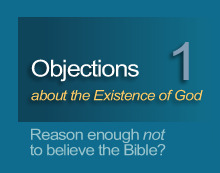"The idea that God is an oversized white male with a flowing beard who sits in the sky and tallies the fall of every sparrow is ludicrous."
- Carl Sagan
WHY THIS?
This is an extremely reasonable question; the answer to which is spread over three of the entire site's seven divisions; "Introduction", "Integrity", and "Veracity".
No one has ever seen God; but if we love one another, God lives in us and his love is made complete in us.
- 1 John 4:12
Until seeing pink unicorns, we assume they don't exist. So until seeing God, how can we believe he exists?
"I don't have the evidence to prove that God doesn't exist, but I so strongly suspect he doesn't that I don't want to waste my time."
- Isaac Asimov
Author of "Isaac Asimov's Guide to the Bible"
Many nonbelievers emphasize that they do not know if there is a God because they haven't been sufficiently convinced of his existence. They reasonably argue that it is standard practice for anyone, including Christians, to generally assume the nonexistence of something unless sufficient proof exists to show otherwise.
For instance, it is reasonable to assume that there are no pink unicorns unless and until we have good reason to believe there are. This reasoning is sound, but where the contention lies is in the amount and type of evidence, and in one's definition of sufficiency.
Christians maintain that there is sufficient proof to rationally conclude that there is a God, and that he manifested himself in Jesus Christ. As to what constitutes sufficient evidence, that is discussed here, but Christians believe that evidence includes numerous historical, archaeological, teleological, medical, scientific, and theological proofs (this site does not currently address many of the teleological or medical evidences).
See also:
The cosmological argument for God
Introduction to Veracity



Expanded!